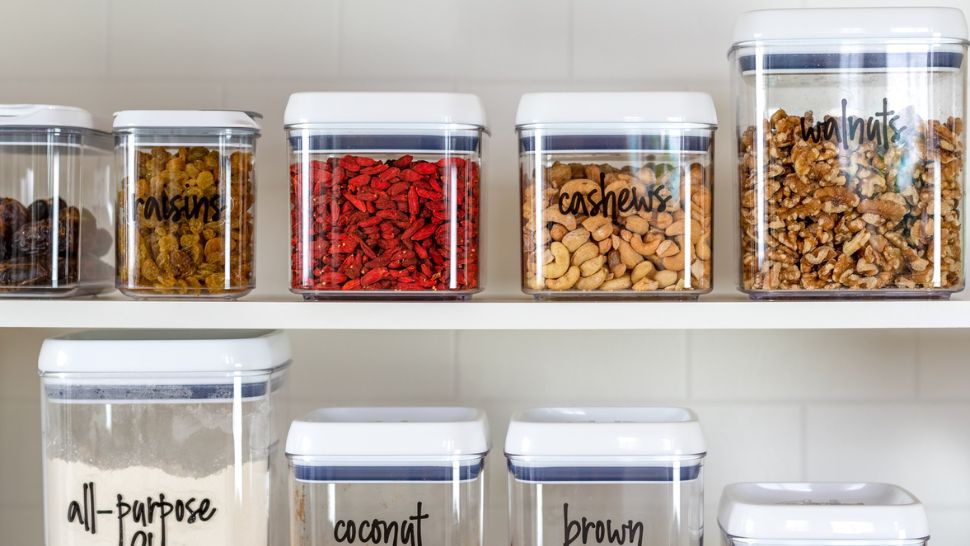
Do you dread opening your pantry? If you find yourself overwhelmed when rummaging through an overpacked cupboard and realizing you have entirely full cabinets but nothing to eat, you might need a pantry makeover.
A well-stocked pantry should work with you, not against you – having a supply of the right pantry staples on hand makes cooking at home simpler and, dare we say it, more fun. Not only does having a store of the staples make preparing foods easier, but it also provides peace of mind to know you have plenty to pair with your weekly shop or can pull together quick last-minute pantry meals if you’re getting low on more perishable foods between grocery trips.
Stocking a pantry with cooking and baking basics doesn’t have to be hard. In fact, it can be incredibly simple to build a cache of pantry staples over time, and to keep foods and products you use often on hand. Below are a few tips for keeping your cabinets organized week-after-week and a table of shelf-stable food items to get you started:
- Start small and expand. Building a well-stocked pantry doesn’t have to happen all at once. Buy a few shelf-stable basics per week and store up your staples over time.
- Stay organized. Nothing is worse than opening a disorganized pantry and not being able to find what you need. Instill some general pantry rules like all canned goods in one area and all baking products on a bottom shelf and take a few minutes each week to organize before shopping to keep things tidy.
- Do regular pantry audits. While many dried foods like beans, grains, and flours can last months or even years, most pantry staples will expire eventually. Once every month review expiration dates, and ideally make plans to use anything that’s going to bad soon to try and avoid having to throw out questionable items to keep your food hoard fresh. Also note items that are running low and add them to your next grocery list.
- Practice first in, first out. Meaning when you have duplicates or similar items, use up the one that you purchased first before opening the newer product.
- Get creative. Once you’ve mastered having basic pantry staples on hand, get creative to add more flavor (and fun) to your meals. Try adding fermented foods like kimchi, interesting sauces like spicy harissa, and dried flavorings like nori or dukkah for culinary creativity.
| GRAINS AND STARCHES | ||
| Brown rice
Quinoa Farro |
Dried lentils
Dried beans Dried chickpeas |
Whole wheat pasta
Rice noodles Soba noodles |
| CONDIMENTS, SAUCES, AND PRESERVES | ||
| Mustard
Mayonnaise Ketchup |
Hot sauce
Salsa Soy sauce |
Jams
Pickles Olives |
| CANNED OTHER SHELF STABLE FOODS | ||
| Canned beans
Canned vegetables Canned fruit (in natural juice) |
Canned sauces
Canned pastes (tomato, etc.) |
Tuna or other fish
Canned meats Tofu |
| NUTS, SEEDS, AND SNACKS | ||
| Almonds
Walnuts Sunflower seeds |
Peanut butter
Almond butter Tahini |
Pretzels
Granola Dried fruit |
| OILS, VINEGARS, AND LIQUIDS | ||
| Neutral cooking oil
Olive oil Specialty oils (sesame, etc.) |
Balsamic vinegar
Rice vinegar White vinegar |
Mirin
Wine Stocks
|
| HERBS AND SPICES | ||
| Dried basil
Dried oregano Dried thyme |
Kosher salt
Flaky sea salt Ground peppercorns |
Ground cinnamon
Ground turmeric Paprika Garlic powder |
| BAKING BASICS | ||
| All-purpose flour
Whole wheat flour Active dry yeast |
Baking soda
Baking powder Cocoa powder |
Granulated sugar
Brown sugar Vanilla extract |
Looking for pantry meal recipe ideas? Check out Bon Appetit Magazine’s recipe ideas using pantry staples for when you feel like there’s nothing fresh in the refrigerator (that’s when pantry staples shine!).